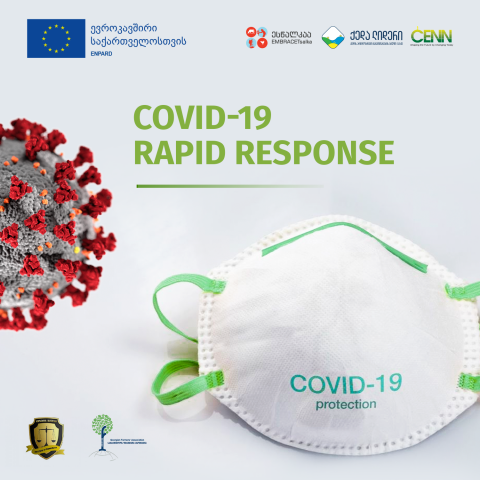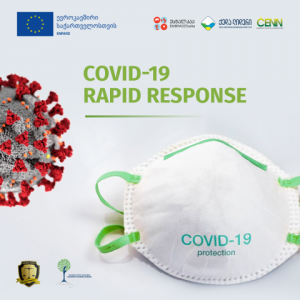How Are Organizations Tackling the COVID-19 Crisis?
Covid-19 Rapid Responses from EU ENPARD Supported Projects ‘Keda Leader’ and ‘Embrace Tsalka’.
The coronavirus pandemic has caused a crisis in almost all aspects of human life, from public health to social interaction to business. While urban areas are typically taking it harder given the bigger population, the rural areas also have many challenges to overcome due to the pandemic. Despite having some advantages in battling COVID-19, like the dispersion of populations which “naturally” stimulates the needed social distancing, rural areas are suffering for the lack of health institutions and professionals, and have more difficulties accessing online learning resources. Further, as traveling and therefore tourism is temporarily nonexistent, the rural population is now trying to get by with little income, often having no choice but to make education less of a priority. Especially for a country like Georgia, considering the fact that its economy depends heavily on the agricultural and tourism sectors, it is crucial to act urgently and come up with plans, programs and projects to revive rural life. In an effort to respond to these issues, the EU-supported Keda and Tsalka Local Action Groups (LAGs), in partnership with CENN, came up with yet another innovation, announcing a special grant competition in two municipalities: Keda and Tsalka. Read on to find out more about it, and to meet the winners.
Within the frames of EU supported on-going ‘Keda Leader’ and ‘Embrace Tsalka’ projects, implemented by CENN under the European Neighborhood Program for Agriculture and Rural Development (ENPARD), the Local Action Groups (LAGs) of Keda and Tsalka announced a grant competition to stimulate a fast response to COVID-19. Titled ‘New Challenges – New Possibilities,’ the competition was announced in early April, and the finalists have now been revealed.
Of 13 applications sent to the Keda LAG, and 17 sent to the Tsalka LAG, a total of six winners were selected, three in each municipality, following careful assessment. The finalist projects will be tackling health, economic and educational issues posed as a result of the COVID-19 pandemic.
Health
One of the winners of the Tsalka Municipality grant submitted a project which will contribute to the effective management of the crisis caused by the spread of coronavirus in the municipality, both by training and equipping medical and public health specialists and by raising public awareness and developing essential skills.
We spoke to Simon Gabrichidze from the project ‘Supporting effective management of COVID-19 in Tsalka Municipality’.
“This is a project that is much needed in these pandemic times. Our project was pre-approved by the NCDC as we followed all the recommendations given by the health professionals,” he told GEORGIA TODAY. “Our project facilitates the process of retraining medical staff to manage the spread of coronavirus at a local level, and raises awareness among the locals of Tsalka to fight the spread of the virus. We have also distributed necessary equipment, like sanitizers, to the municipality to be delivered to those most in need.”
Managing our wellbeing during an infectious disease outbreak like COVID-19 goes beyond our physical health and it is important that we don’t overlook mental health needs during the crisis.
Another winning health project in Keda responds to this issue very well. The ‘Keda against the Coronavirus’ project, by the ‘Mental Health Protection Organization,’ envisages offering primary psychological help and support in Keda municipality, including the training of parents of adolescents (and the parents of adolescents with disabilities) in psychology, so as to guide them in assisting teens to better deal with the stress of the new situation.
Education
Whilst the education sector adapted to the new reality and moved all its activities online, this was not uniformly implemented across the country and nor is access to online services available for everyone, particularly those living in remote villages. For this reason, in Tsalka, two winning projects tackle the problems in the educational field posed by the pandemic. One of the projects is titled ‘Equal Opportunity for All Citizens to Education and Information’ and aims to increase access to education and information, develop online learning courses, and equip target groups with the necessary technology.
Another Tsalka winner is a project titled ‘Tsignieri Mekvavile’ (Well-read florist). Due to the crisis caused by the spread of COVID-19, the project aims to reduce the psychological and emotional problems of students living in four different villages of Tsalka Municipality, and support their engagement in online educational activities whilst in isolation.
Keda municipality had its own finalist to address the current educational challenges. ‘The Support, Education and Strengthening of Keda’ from non-commercial legal entity ‘Global Entrepreneurial Network - A Step to Success’ aims to raise awareness among youth and the socially vulnerable of the need to hone their practical skills, and in doing so support their personal and professional development. Within the scope of the project, local youth between 14-18 and 18-25, chosen with specific criteria, will participate in a training cycle of informal education, the themes of which will be:
- Basic human rights and the protection of those rights;
- Leadership and communication;
- Volunteering and possibilities for youth;
- How to write a motivational letter and resume, and interview techniques;
- How to write a project;
- The importance of social media/computer skills;
- Cyber-safety and cyber-crimes;
- Democracy and Government.
Tourism
With borders still shut and foreign tourists having canceled their planned holidays, tourism sector players- guesthouse and hotel owners and other tourism-related companies -must seek alternative ways to support their businesses, adjusting their services to the current reality; for a start, by focusing more on domestic tourism.
GEORGIA TODAY spoke to the representative of one of the winners- Tinatin Gholadze, from ‘Global Entrepreneurial Network,’ whose project ‘The Development of Online Tourism in Mountainous Adjara’ is set to support the development of the local tourism sector through innovation. The project facilitates the delivery of tourism services, and aims to popularize the culinary and cultural tourism of the region, as well as to empower women in this endeavor. It also envisages helping local entrepreneurs to transfer their services to the digital world, all the while helping them develop their digital competencies and generating special offers which will help them to earn extra income.
“We’re very glad that our project got to be one of the finalists and that we have been blessed with an opportunity to contribute to the process of development and digitalization of the tourism in Keda municipality,” Gholadze told us. “Our project aims to facilitate the development of Keda municipality’s touristic potential during the crisis caused by the coronavirus pandemic. We want to support those in the tourism sector by helping them to develop their digital skills and competencies, putting Keda municipality’s touristic potential to full use, and helping them to attract tourists.”
The six supported projects are expected to go a long way to bringing their target communities positively through the coronavirus crisis, promoting effective management of the crisis, ensuring equal and timely access to education and information and reducing psychological and emotional problems, all examples that can be learned from and built upon countrywide.
The EU-funded COVID-19 rapid response grant competition was announced in the framework of the EU-supported projects “Keda LEADER” and "EMBRACE Tsalka". The projects are implemented under the European Neighborhood Program for Agriculture and Rural Development (ENPARD) by CENN with partner organizations in Keda and Tsalka municipalities
By Nini Dakhudaridze











